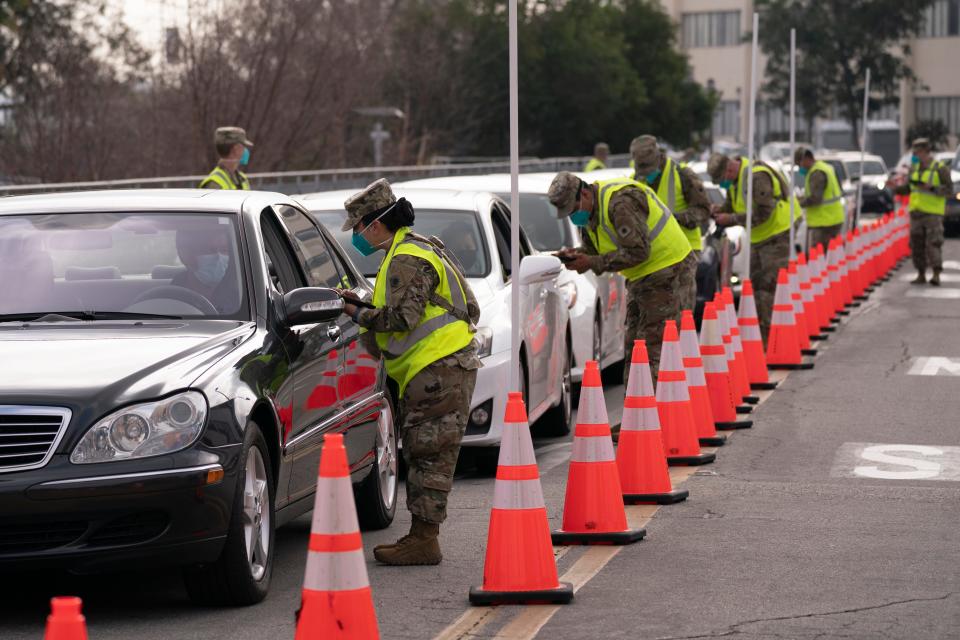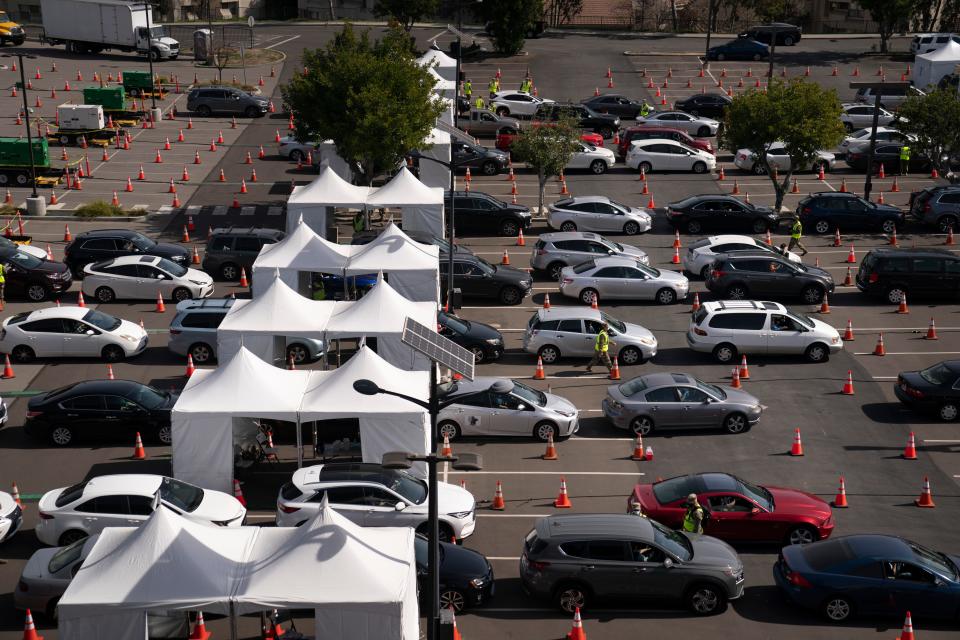Winter storm delays vaccinations; FEMA opens first mass vaccination sites in California. Latest COVID-19 updates.
The winter storm driving icy roads, power outages and dangerously low temperatures across much of the nation Tuesday was snarling traffic from coast to coast and delaying vaccine shipments.
Texas state health officials, due to receive more than 400,000 additional vaccine doses this week, don't expect deliveries until at least Wednesday. And vaccine appointments in Houston and Austin were expected to be canceled again Tuesday because of the severe winter weather.
Shipments were also being delayed to Florida, said Jared Moskowitz, director of the Florida Division of Emergency Management. It was unclear how many doses would be affected and when deliveries would resume.
In Illinois, more than a hundred providers in Chicago did not receive their expected vaccine shipments Tuesday, said Dr. Allison Arwady, commissioner of the Chicago Department of Public Health. All vaccination and testing sites operated by the city were closed Tuesday following Chicago's largest snowfall of the year.
Meanwhile, in California, where San Francisco and Los Angeles temporarily closed city-run mass vaccination sites, the Federal Emergency Management Agency opened its first mass vaccination sites Tuesday, setting up in Los Angeles and Oakland.
Despite the delays, President Joe Biden expressed optimism Tuesday that the U.S. vaccine rollout will surpass forecasts.
"Before I took office, I set a big goal of administering 100 million shots in the first 100 days," Biden tweeted Tuesday. "With the progress we’re making I believe we’ll not only reach that, we’ll break it."
Experts have argued that Biden’s goal may not be enough to get the nation to the point where vaccines are readily available by spring. Vaccines must be manufactured, shipped and jabbed much more quickly, they say.
Dr. Anthony Fauci said last week that it would be "open season" for all Americans who want the vaccine by April. But the timeline remains unclear since the rollout has been marred by a lack of supply, forcing vaccination sites to shut down and leading to long lines and thousands of people on waiting lists. Biden has also said previously most Americans won't be vaccinated until the end of the summer.
USA TODAY is tracking COVID-19 news. Keep refreshing this page for the latest updates. Want more? Sign up for our Coronavirus Watch newsletter for updates to your inbox and join our Facebook group.

In the headlines:
►One year into the COVID-19 pandemic, millions of N95 masks are pouring out of U.S. factories and heading into storage, but there still aren’t nearly enough going to hospitals, an Associated Press investigation found.
►Fran Goldman, 90, didn't let a foot of snow deter her from her vaccination appointment. She told the Seattle Times she walked six miles round trip for her vaccine Sunday – and was only five minutes late. Her daughter Ruth shrugged it off: "We're outside people."
►The parent company of Norwegian Cruise Line, Oceania Cruises and Regent Seven Seas Cruises has canceled sailings until June "as we continue to work through our return-to-service plan to meet the requirements" of the U.S. Centers for Disease Control and Prevention, spokesman Andrea DeMarco said in a statement.
►Chinese authorities say they are cracking down on vaccine-related crimes. Prosecutors there have approved the arrests of 70 suspects involved in 21 vaccine-related frauds, according to the prosecutor general's office. One case involved 58,000 counterfeit vaccine doses using normal saline that drew $3 million in sales.
►President Joe Biden is extending a ban on home foreclosures for federally backed mortgages by three months and expanding a mortgage relief program to provide relief for families struggling financially amid the COVID-19 pandemic.
►Governors are asking Biden for more say in how the federal government is distributing COVID-19 vaccines to local pharmacies and community health centers in their states.
📈 Today's numbers: The U.S. has more than 27.75 million confirmed coronavirus cases and 487,900 deaths, according to Johns Hopkins University data. The global totals: More than 109.4 million cases and 2.4 million deaths. More than 71.6 million vaccine doses have been distributed in the U.S. and about 55.2 million have been administered, according to the CDC.
📘 What we're reading: There's no "giant national campaign" for COVID-19 vaccine education. Why? Experts say there's a better way.

NYC data shows majority-white ZIP codes have higher vaccination rates
Data released by New York City Tuesday shows drastic differences in vaccination rates by ZIP code. Areas with the highest rates of COVID-19 deaths – where a majority of residents are people of color – had lower vaccination rates than majority-white ZIP codes that have lower death rates.
Among the city's three ZIP codes with the highest death rates – East New York in Brooklyn, Flushing in Queens and Brighton Beach in Brooklyn – the highest vaccination rate was 7%. Meanwhile, City Island and Breezy Point, two beachside majority-white ZIP codes with half the death rates, had vaccination rates of 26% and 27%.
"This is upside down. It can not stand," Mark Levine, a city councilmember and chair of the Council Committee on Health, said on Twitter.
An earlier USA TODAY analysis found similar trends in Chicago, Washington, D.C., and Austin, Texas. Two majority-white Chicago ZIP codes, for example, had death rates three times lower and vaccination rates three times higher than in the areas with majority-Black and majority-Hispanic residents.
Feds increase vaccine shipments and 'supply will continue to ramp up'
States will receive a 23% increase in vaccine shipments this week over last week, a 57% increase since President Joe Biden took office, administration officials told governors Tuesday.
The number of doses states will receive will increase from the 8.6 million a week they received during Biden's first week in office to the 13.5 million that Biden's COVID-19 coordinator told governors Tuesday they will now receive. The White House also announced that it’s doubling to 2 million the number of doses being sent directly to local pharmacies.
“This program will expand access to neighborhoods across the country,” Jeff Zients, Biden’s COVID-19 coordinator, told USA TODAY in an exclusive interview before holding his weekly call with governors. “Supply will continue to ramp up.”
– Maureen Groppe
CDC: Don't take preemptive pain meds ahead of vaccination
The vaccines currently in use the the U.S. can cause temporary side effects that "may affect your ability to do daily activities," but the Centers for Disease Control and Prevention is warning against preemptive doses of aspirin or other painkillers before vaccination. The CDC says fever, chills, headaches, soreness and tiredness are normal signs that your body is "building protection." Over-the-counter medicines such as ibuprofen, aspirin, antihistamines or acetaminophen can help with that, the CDC says.
"It is not recommended you take these medicines before vaccination for the purpose of trying to prevent side effects," the CDC says. "It is not known how these medications may impact how well the vaccine works."
Syringe shortage plagues Japanese vaccination effort
Japan is scrambling to secure special syringes to maximize the number of vaccine shots used from each vial of Pfizer vaccine amid fears that millions of doses could be wasted.
Japan, with a population of 126 million, has a deal for 144 million doses that could vaccinate 72 million people. But without special syringes, the numbers could drop more than 15%. The government, still hoping to host the Summer Olympics starting in late July, is asking medical equipment manufacturers to boost output of the low dead-space syringes. Nipro Corp. said it planned to boost its monthly capacity.
"We are getting a request from the health ministry and we need to take some steps," Nipro said in a statement to Japan Today. "But it's not something we can do overnight. It's another four to five months before we can ramp up sharply."
NBA outlines protocols for All-Star Game despite pushback from stars
The NBA revealed its health and safety protocols for the All-Star break in a memo to teams, including protocols for the All-Star Game on March 7. The game has not been officially announced, and Lebron James is among prominent players who expressed dismay at the idea of conducting an All-Star game amid a pandemic.
All players are required to undergo COVID-19 testing while the league takes a break March 5-10. Players participating in All-Star events – either the game, dunk contest or 3-point shootout – are required to travel to Atlanta on March 6 via private transportation, and participation is dependent on returning negative tests on March 6 and March 7.
– Jeff Zillgitt
Experts fear fourth surge this spring
COVID-19 infection and hospitalization rates are falling nationwide, but experts talk in dire terms about what will happen if variants of the virus are allowed to surge this spring.
The U.S. saw a spike in cases last spring, mainly in the Northeast, last summer in the South, and November through January pretty much everywhere. As the nation's death toll from COVID-19 approaches half a million people, public health experts said they dread the possibility of a fourth wave. Three state legislatures lifted mask mandates in recent days, and New York and Massachusetts eased restrictions on restaurant seating in time for Valentine's Day.
"It's like we're trying our best to help the virus rather than stopping it," said Theodora Hatziioannou, a virologist and research associate professor at the Rockefeller University in New York City.
– Karen Weintraub
Contributing: James Call, USA TODAY; The Associated Press.
This article originally appeared on USA TODAY: COVID news: Winter storm delays vaccine shipments to Texas, Florida

 money
money 